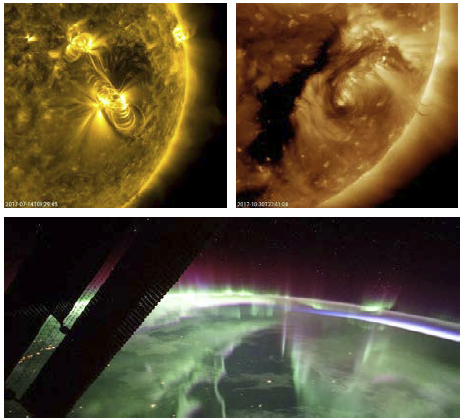Recognition of the importance of space weather has been increasing over the past 20 years, largely due to new knowledge about the many impacts to human technology from solar and geomagnetic storms. Students with a minor in space weather will be well positioned to either continue their education in graduate school or find employment in one of the many industries where knowledge of space weather is important. These fields include electric power, aviation, navigation, communications, and satellite industries. Students who achieve an M.S. in space weather research will be able to contribute their expert knowledge to these fields, and may have the opportunity to round out their programmatic experience with research assistantships at Catholic University and NASA Goddard.
View the Advanced Space Weather Research brochure
Our goal is to provide students with an understanding of space weather system science, including the origins of space weather on the sun, transport of particles and radiation through space, interaction of the solar wind with the magnetosphere, space plasma physics, magnetosphere-ionosphere coupling processes, and the chemistry, dynamics, and electrical properties of the ionosphere and thermosphere.
Master of Science in Applied Space Weather Research
- Students with, or about to earn, bachelor's degrees in the sciences, mathematics, or engineering and other technical disciplines will be eligible for this master's program.
- Both thesis and non-thesis options will be available, as well as a non-thesis 4+1 track for continuing undergraduates.
- The thesis option requires:
- 18 semester hours of core space weather courses. Any six of the following three-credit courses can be selected to fulfil this requirement: ASWR 601, ASWR 602, ASWR 603, ASWR 604, ASWR 628, and PHYS 525, ASWR 562, PHYS 536.
- Two additional courses from the same list or two elective non-ASWR courses can be added to meet the 24-credit goal.
- The master’s thesis research project will account for an additional 6 semester hours. The research topic will be selected in consultation with the student’s program advisor and may be linked to work done in coordination with NASA Goddard Space Flight Center.
- The non-thesis option requires:
- 24 credit hours of core ASWR courses from the above list
- 6 additional graduate-level credit hours that may comprise courses taken in other departments at CUA, with the student’s program advisor or the director’s consent.
Minor in Applied Space Weather Research
- Students currently, or soon to be, enrolled in any major are eligible for this minor program.
- Students must complete 18 credit hours for this minor, which includes:
- 4 three-credit courses from the core courses options and
- 2-3 electives chosen from those offered on the course list.
For general inquiries, please email us at space-weather@cua.edu.
Points of contact:
Dr. Vadim Uritsky, ASWR Program Director
Dr. Robert Robinson
Dr. Gang Kai Poh

